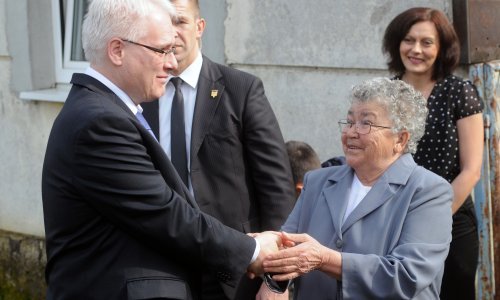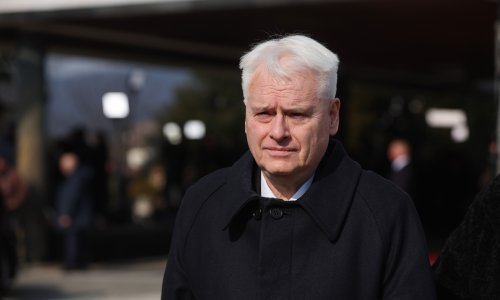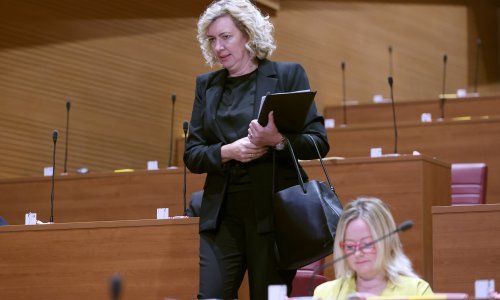Croatian President Ivo Josipovic on Friday offered his best wishes to all Croatian citizens for Statehood Day, June 25, and the 20th anniversary of Croatia's independence, calling on them to make that day a day of national pride and self-respect, and of love for the homeland and all its people, regardless of their ethnicity and religion, profession, world view and political and other beliefs.
"Tomorrow is the twentieth anniversary of our Republic of Croatia. It is the occasion to remember with pride the sources of our Homeland. Let us remember the sources of our statehood and our democracy, inscribed in the Constitution, and especially antifascism and the Homeland War, in which the best among us defended our freedom even at the cost of their life," the president said in his Statehood Day message, aired on Croatian Television.
He called on citizens to remember the past with pride on Saturday, but to also turn with self-confidence to the future. He recalled that earlier today, at the European Union, decisions were made that would be the crown of Croatia's 20 years of efforts to fully integrate with the European world of democracy.
Recalling the events of 20 years ago, he said: "We remember with respect those who defended our freedom with weapons in their hands. It was not an easy task. Thousands lost their lives, hundreds of thousands lived in bitterness and exile, more than one thousand and eight hundred of our citizens are still on record as missing, towns, villages, roads and railways, industrial plants were destroyed... For many the consequences of aggression against Croatia spelled death, destruction, poverty and hopelessness."
Josipovic said that the freedom Croatians longed for in those decisive times was not only the freedom of the Croatian state, the Croatian people and the ethnic minorities. "We wanted full freedom, one that does not recognise limits other than those set by the freedom of other people."
"States which make freedom possible for their citizens with justice and righteousness are states of happy citizens. Democracy and human rights are the framework and the cradle of freedom, our own freedom included. This is why we continue to fight for our freedom and the freedom of others, constantly and tirelessly, even today when we have our own state."
Today Croatia belongs to the free and progressive world. As a member of the United Nations and NATO, along with the most powerful advocates of freedom and democracy, Croatia participates in military missions and diplomatic efforts focused on the benefit of humankind, Josipovic said.
Speaking about the dark side of Croatia's path towards freedom and the building of a democratic society, Josipovic said there were people who reacted to evil with evil, to injustice with injustice, and people who committed crimes.
There were also those who used war and suffering to plunder their own homeland and their fellow citizens. Some people took advantage of the necessary ownership transformation and privatisation in order to get hold of national wealth created over centuries under the cover of the war turmoil and political power. "The unwillingness to prosecute and punish such people indicates only one thing: they enjoyed strong political support. But times change, politics changes," Josipovic said, adding that the crimes and irregularities committed would not go unpunished.
Commenting on decisions made earlier in the day in Brussels, Josipovic said that by implementing reforms Croatia had become a better, more successful, more democratic and freer country.
Some reforms, he warned, have yet to take hold.
The judicial reform must be completed, the economy needs to be made competitive and freed from red-tape, and other important reforms, such as the reform of state administration and of local self-government units, must not be delayed any longer, he said.
"Croatia's entry in the European Union is an opportunity for the Croatian economy to open up, finally and boldly, to the challenges and risks of global market competition. We shall succeed in this effort only by investing into knowledge – much more than so far. Science, education and culture will be our main allies in the cultivation of our national and state identity, one of the most important engines of our development and competitiveness," Josipovic said, calling for freeing business of inappropriate political influence.
"The huge ownership stake of the state in the Croatian economy is too great a temptation for corruptive behaviour. Economic policy can no longer be based on borrowing. Today the social welfare state cannot be maintained by borrowing," he said, adding that it can be built successfully by promoting continuous creation of high added value products.
"Social justice needs to be achieved not through the equality of poverty but through the solidarity of the broad circle of successful subjects with the minority which, for some reason, is not blessed with success. In a just and righteous system pensions are not charity but the means providing a secure old age. This can be achieved only by reinforcing economic activity and employment."
Commenting on the forthcoming parliamentary elections, Josipovic said he expected citizens to reward with their trust "the brave and the reasonable, the people who recognise the challenges of our freedom and not those who cater to our fears."
In order to keep up with highly dynamic changes in the globalised economy, Croatia's political system needs to become more representative, he noted.
"We need to reform our political system in a way which will make our political representatives more directly and more broadly responsible to the citizens and less to party power circles. Responsibility must have a face, a name and a surname."
He also said that Croatia must open up to its neighbourhood more boldly, just as Europe was opening up to Croatia.
Once it joins the EU, Croatia will also support the EU's expansion to its neighbours, he said.
Underlining the need to deal with problems that were a consequence of the war and the legacy of the failed common state, Josipovic said, "Reconciliation based on forgiveness, understanding and cooperation, but also on the awareness of the committed crimes and responsibility for them, is the only true way to peace and good-neighbourly relations."

































